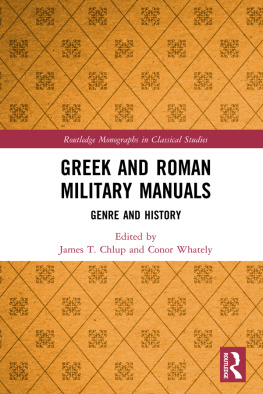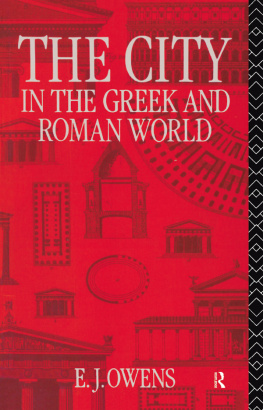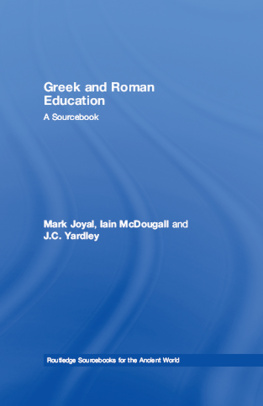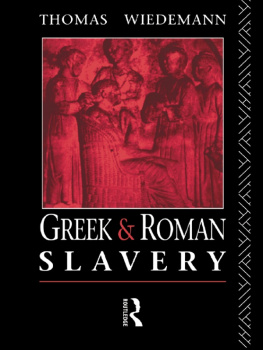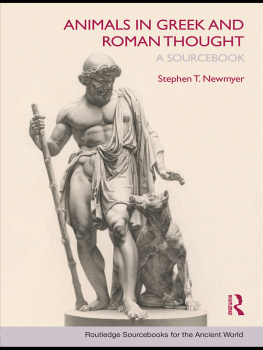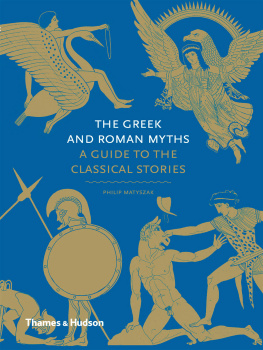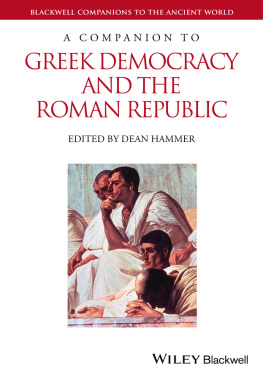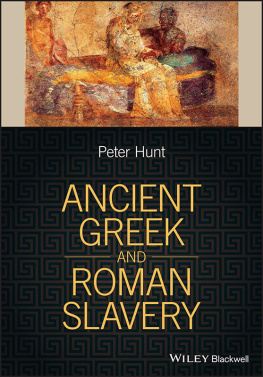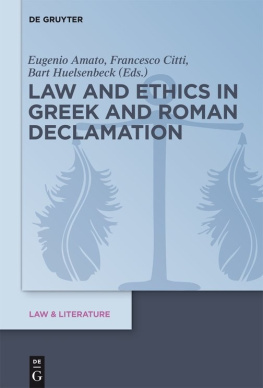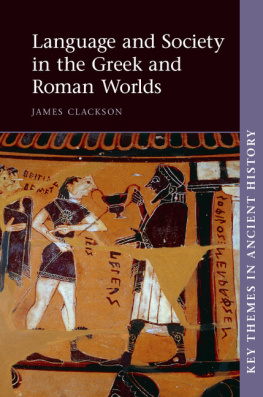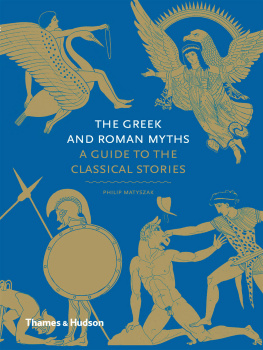Chlup James T. - Greek and Roman Military Manuals
Here you can read online Chlup James T. - Greek and Roman Military Manuals full text of the book (entire story) in english for free. Download pdf and epub, get meaning, cover and reviews about this ebook. year: 2021, publisher: Taylor & Francis Group, genre: Politics. Description of the work, (preface) as well as reviews are available. Best literature library LitArk.com created for fans of good reading and offers a wide selection of genres:
Romance novel
Science fiction
Adventure
Detective
Science
History
Home and family
Prose
Art
Politics
Computer
Non-fiction
Religion
Business
Children
Humor
Choose a favorite category and find really read worthwhile books. Enjoy immersion in the world of imagination, feel the emotions of the characters or learn something new for yourself, make an fascinating discovery.
- Book:Greek and Roman Military Manuals
- Author:
- Publisher:Taylor & Francis Group
- Genre:
- Year:2021
- Rating:4 / 5
- Favourites:Add to favourites
- Your mark:
- 80
- 1
- 2
- 3
- 4
- 5
Greek and Roman Military Manuals: summary, description and annotation
We offer to read an annotation, description, summary or preface (depends on what the author of the book "Greek and Roman Military Manuals" wrote himself). If you haven't found the necessary information about the book — write in the comments, we will try to find it.
Greek and Roman Military Manuals — read online for free the complete book (whole text) full work
Below is the text of the book, divided by pages. System saving the place of the last page read, allows you to conveniently read the book "Greek and Roman Military Manuals" online for free, without having to search again every time where you left off. Put a bookmark, and you can go to the page where you finished reading at any time.
Font size:
Interval:
Bookmark:
This volume originates from a conference on ancient military manuals jointly held by the Universities of Manitoba and Winnipeg in October 2016. The conference arose from discussions the editors have had about courses on ancient (primarily Roman) warfare and the appropriate place for military manuals as primary sources therein. Some of the chapters in this volume are revised and expanded versions of papers presented at the conference; a few appear at the invitation of the editors. Our goal in preparing this volume is to provide a resource for scholars and students interested in ancient warfare and ancient military writing and to demonstrate the versatility of the genre. The authors constitute established, emerging, and new scholars from around the world whose work intersects with the field of military literature. The volume is very much designed with a view to opening up new lines of enquiry on ancient military manuals.
First and foremost, the editors thank the conference participants for braving the (in some instances quite long) journey to Winnipeg. Gratitude is due also to those contributors who were willing to share ideas and provide guidance on matters directly related and peripheral to this volume: Aaron L. Beek, Craig H. Caldwell, Jeffrey Rop, Nadya Williams, and Graham Wrightson. The editors most warmly express their appreciation to their home institutions for generous financial and other support for the hosting of the conference and the preparation of this collection, especially our Department Heads, Lea Stirling and Matt Gibbs, the Faculty of Arts at both institutions, Tourism Winnipeg for some promotional materials, and those colleagues from both institutions who provided support in other ways, whether by attending the conference or in conversation. Additionally, Ruth Dickinson, the students of the Roman Warfare and Imperialism course at the University of Manitoba in fall term 2016, and Oliver Zhou provided help at the conference or with the preparation of the volume. A significant debt of gratitude is owed to Immacolata Eramo for agreeing to read the draft chapters and write the epilogue. Finally, the editors thank the team at Routledge for their assistance in the publica tion of this volume.
James T. Chlup
Conor Whately

Military manuals from Aeneas Tacticus to Maurice
Conor Whately
One of the most important sources for the military history of the classical world is the enigmatic military manual. Both Greek and Latin handbooks survive, with the earliest dating to the fourth century BCE, and the latest to the end of antiquity (c. 590 CE) and beyond (Byzantine Middle Ages, c. 6001453 CE). Although usually lumped together, their diversity belies simple classification.phalanx had once seemed antiquarian at best and anachronistic at worst, a good case has been made for the continued employment of that formation, the phalanx, when needed in Roman combat. Such a contention underscores the complexity of these manuals and shows how little understood they remain despite their prominence and regular use as sources for ancient warfare and ancient history in general.
This chapter provides a necessarily select overview of the surviving manuals and the scholarship, addresses the hitherto overlooked questions of genre and who read military manuals, and looks at their use as historical sources and their often close relationships to works of ancient history. This chapter will provide a frame of reference for the chapters that follow, while also providing an introduction to the genre as a whole.
It is not much of a surprise that military manuals emerged in such a bellicose and highly literate (at least on some levels) world. War was ubiquitous in the ancient Mediterranean, and its impact and regularity were such that it had a marked impact not just on more obvious matters, like economic and political concerns, but less obvious ones too, like a states cultural output. As the introduction notes, the poetry of Homer and the histories of Herodotus and Thucydides used war as their subjects and in turn influenced how later authors wrote about war. In their world, war was usually waged either by means of battles, sieges, or some combination thereof. It is not surprising, then, that most of the surviving military manuals, especially those in Greek, focus on some aspect of open battle or siege warfare.
One author and one war has had a bigger impact than any of the others, and that is Homer and his account of the Achilles, the fight-from-the-front-line archetype, and the Odysseus, who deploys stratagems or ruses. Indeed, regardless of whether a historian had a predilection for presenting one kind of general or another, or any type of warfare, with the exception of naval combat, he need only trawl the pages of the Iliad or, less likely, the Odyssey, to find a Homeric precedent. With the exception of generalship, more often than not, single combat and massed phalanx-like combat were what they remembered and chose.
Whether Aelian was right, and Homer was the first person to write about military theory, it is more difficult to assert that he was the first writer of military manuals. So what was the first manual stricto sensu? A good case could be made that one or two of Xenophons works might constitute the first such text, particularly his On the
In one particular episode of the text, the main characters cover a host of pertinent material, and it is centred round a discussion involving Cyrus and his father Cambyses about education in the arts of war. During that discussion, an unnamed man had trained Cyrus on how to be a general and he taught him a number of things. After referring to logistics and health Cyrus says the following:
he professed to have been teaching me generalship. And thereupon I answered, tactics. And you laughed and went through it all, explaining point by point, as you asked of what conceivable use tactics could be to an army, without provisions and health, and of what use it could be without the knowledge of the arts invented for warfare and without obedience.
(1.6.14)
Tactics, morale, obedience, and generalship are stressed here. A little later, Cambyses advocates the use of stratagems; it is not enough to defeat ones foe on the field in pitched battle alone (1.6.2740). Then Cambyses turns to battle itself (a long passage, to be sure, but worth quoting in full):
But if it is ever necessary as it may well be to join battle in the open field, in plain sight, with both armies in full array, why, in such a case, my son, the advantages that have been long since secured are of much avail; by that I mean, if your soldiers are physically in good training, if their hearts are well steeled and the arts of war well studied. Besides, you must remember well that all those from whom you expect obedience to you will, on their part, expect you to take thought for them. So never be careless, but think out at night what your men are to do for you when day comes, and in the daytime think about how the arrangements for the night may best be made. But how you ought to draw up an army in battle array, or how you ought to lead it by day or by night, by narrow ways or broad, over mountains or plains, or how you should pitch camp, or how station your sentinels by night or by day, or how you should advance against the enemy or retreat before them, or how you should lead past a hostile city, or how attack a fortification or withdraw from it, or how you should cross ravines or rivers, or how you should protect yourself against cavalry or spearmen or bowmen, and if the enemy should suddenly come in sight while you are leading on in column, how you should form and take your stand against them, and if they should come in sight from any other quarter than in front as you are marching in phalanx, how you should form and face them, or how any one might best find out the enemys plans or how the enemy might be least likely to learn his [Cambyses does not complete his thought]. I think, then, that you should turn this knowledge to account according to circumstances, as each item of it may appear serviceable to you.
Font size:
Interval:
Bookmark:
Similar books «Greek and Roman Military Manuals»
Look at similar books to Greek and Roman Military Manuals. We have selected literature similar in name and meaning in the hope of providing readers with more options to find new, interesting, not yet read works.
Discussion, reviews of the book Greek and Roman Military Manuals and just readers' own opinions. Leave your comments, write what you think about the work, its meaning or the main characters. Specify what exactly you liked and what you didn't like, and why you think so.

